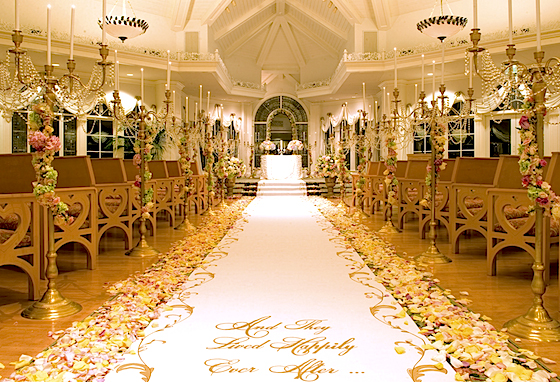What's this have to do with theme parks? Well, Walt Disney World's wedding pavilion is about to see a big increase in business.

Sure, plenty of same-gender couples have participated in ceremonies at Disney over the years. But ask anyone who's been in the wedding business in one of the 35 other states where same-gender marriages have become legal — there's a huge difference in demand when a wedding ceremony is legal than when it is only symbolic.
Analysts at UCLA estimate that more than 24,000 same-gender couples will marry in Florida over the next three years, generating more than $182 million in additional spending, with more than $42 million of that coming from visitors from out-of-state. (I couldn't find data on the number of all marriage licenses issued in the state of Florida for comparison. If anyone knows those numbers, submit 'em in the comments, please.)
No matter who's getting married, if you don't think that Mickey and his team are looking forward to welcoming more soon-to-be newlyweds to the Vacation Kingdom of the World for their weddings and honeymoons, you don't know Disney very well. With wedding packages starting at $2,500, Disney should expect to claim a substantial portion of that $182 million in new spending.
Legal same-gender marriages should help Disney and other theme park companies in the state internally, as well. You don't have to be too much of an insider to know that out gays and lesbians are overrepresented in the entertainment industry compared to the population at large. Florida's inability to offer legal same-gender marriage has put the state at a disadvantage when its parks compete for gay and lesbian personnel with parks in California, where such marriages have been legal since 2013 (plus for a few months in 2008). That's gone now. Florida's wedding industry is open to all as of this week, and theme parks couldn't be happier.
Tweet
The distinction between sex and gender differentiates sex, the biological makeup of an individual's reproductive anatomy or secondary sex characteristics, from gender, social roles based on the sex of the person (culturally learned) or personal identification of one's own gender based on an internal awareness (gender identity).
It is "same-sex" marriage that has been unavailable. "same-gender" marriage as a concept has not been a problem. If you were a male-sex person who self-identified female, you could legally marry a female-sex person, whether that person identified as male, female, bi, or some other gender.
In fact, there may be a good reason not to use "same-gender" marriage here, as it would exclude the cases where two people of the same sex (who could not marry before) can now marry, but where one of those two self-identifies differently from the other.
In other words, under the new circumstance, a female-sex person who identified male can now marry a female-sex person who identifies as female, which would be an "opposite-gender" marriage, which would have been illegal before.
I was wary of using "opposite-gender" there, as it implies only two choices, when there could be many different gender marriages, not just "same" and "opposite".
In any case, congratulations to all the new happy couples in Florida.
This article has been archived and is no longer accepting comments.